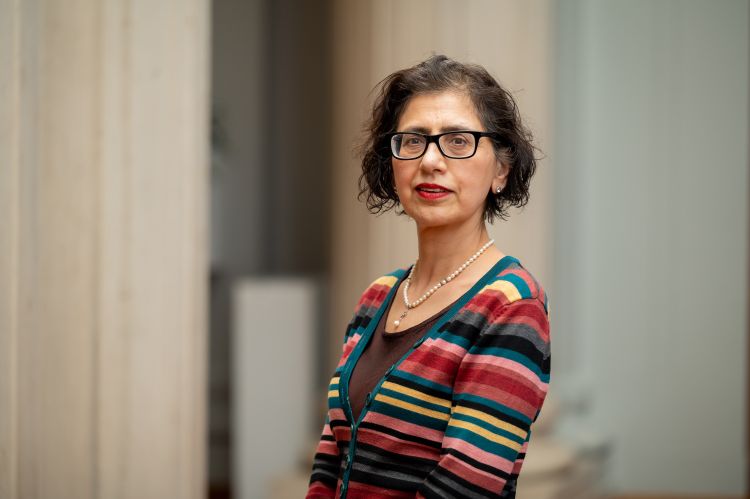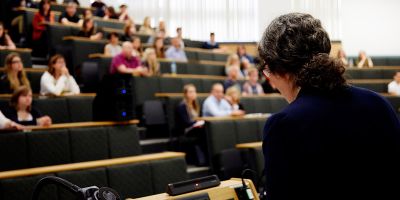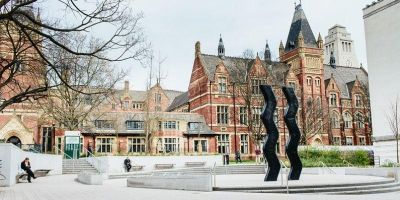Blog: Reimagining Language Education by Kashmir Kaur

This blog is divided into two parts: the first offers a summary of a key plenary talk, while the second is a personal reflection on my experience in the English for Academic Purposes (EAP) landscape.
I attended and presented a talk on Critical EAP at the American Association for Applied Linguistics (AAAL) 2025 conference in Denver, where I engaged with a range of insightful, challenging and thought-provoking talks. I was grateful for the opportunity to connect with international colleagues and reflect on the evolving landscape of language education. Many talks resonated deeply and left me with much to consider.
This blog is divided into two parts: the first offers a summary of a key plenary talk, while the second is a personal reflection on my experience in the English for Academic Purposes (EAP) landscape. My reflection draws on established scholarship on microaggressions, emotional labour and structural dynamics in the higher education sector and has also been informed by the important insights raised in Randolph’s talk. My intent is to contribute to wider conversations about inclusion, equity and belonging in higher education - conversations that many of us, across institutions and contexts, continue to navigate with care and complexity.
Reimagining Language Education: Reflections on Dr. L. J. Randolph's Anti-Colonial Framework and the EAP Landscape
Presenter: Dr. L. J. Randolph Jr, University of Wisconsin–Madison
Talk Title: Toward an Anticolonial World Language Curriculum
Conference: American Association for Applied Linguistics, 22–25 March 2025, Denver, Colorado
Dr. L. J. Randolph is a language educator and scholar whose work centres on anti-colonial curriculum, racial and linguistic justice and culturally sustaining pedagogies. At the 2025 AAAL Conference, he delivered a compelling talk calling for a radical rethinking of world language education - not as a neutral space for communication, but as a critical site for justice, identity formation and collective liberation. His message resonates across educational contexts, including EAP, where colonial legacies remain deeply entrenched.
Randolph opens with a reminder that colonialism is not a chapter of the past but an active structure shaping contemporary language education. From classroom materials to institutional norms, the field continues to centre Eurocentric knowledge systems and capitalist priorities. He challenges educators to acknowledge this reality while also locating themselves in the ongoing struggle for justice. Citing Indigenous-led initiatives such as Spirit of the Sun - a Colorado-based nonprofit organisation that focuses on Indigenous youth empowerment (https://www.spiritofthesun.org) - he reminds us that land acknowledgments must lead to material engagement.
Moving from diagnosis to vision, Randolph examines how early experiences of language learning - especially for racialised students - are often marked by alienation, irrelevance and shame. These affective responses, he argues, are not incidental but shaped by the pedagogical models in place. For example, the dominant grammar-drill paradigm reduces language to a mechanistic performance, stripping it of its relational and affective dimensions. These failures are systemic, not individual.
Language education can also be a space of empowerment. Randolph shares classroom practices that centre students’ identities, knowledges and emotional lives. Through poetry, translingual expression and critical cultural texts, learners explore their connections to land, family and resistance. These examples span elementary to university settings, demonstrating that even novice learners can engage critically with power, identity and place when given the tools and trust. Humanising pedagogy, Randolph shows, is both scalable and transformative.
Critically, Randolph calls out national frameworks such as the American Council on the Teaching of Foreign Languages for failing to address power, race or justice. He advocates shifting from generalised ‘diversity’ to precise naming of colonialism and racism. Drawing on Teaching to Transgress by bell hooks (1994: 207), he reminds us: “The classroom, with all its limitations, remains a location of possibility.”
This possibility, however, demands real shifts. Randolph urges a move:
- From capitalist to humanistic views of language
- From proficiency benchmarks to socio-emotional learning
- From content delivery to liberatory co-creation.
He endorses frameworks such as the Social Justice Standards (Learning for Justice: 2022) and Gholdy Muhammad’s Unearthing Joy (2023), which integrates identity, skills, intellect, criticality and joy into transdisciplinary learning.
The talk’s urgency is heightened by recent events, including the United States Executive Order declaring English the nation’s official language (Trump, 2025). This act, Randolph argues, is not symbolic - it reinforces linguistic imperialism and erasure.
Even in the face of such state-sanctioned setbacks, Randolph reminds us that resistance is not dormant. Liberatory practices are already taking root in classrooms, communities and coalitions - and our task is to sustain, deepen and expand them.
He closes with a call borrowed from abolitionist Mariame Kaba (2021: 31): “We can. We must. We are.”
Decolonising EAP: A Critical Response to Institutional and Curricular Coloniality
English for Academic Purposes (EAP) may appear apolitical, but it is deeply implicated in systems of exclusion and control. Informed by Dr. L. J. Randolph’s 2025 AAAL plenary talk, this article explores how EAP continues to uphold colonial logics (that is, enduring ways of thinking and structuring education rooted in imperial domination - such as privileging standard English, Western knowledge systems and hierarchical classroom practices) - through curriculum, institutional dynamics and epistemic hierarchies. It calls for a shift from performance-oriented instruction to a justice-rooted pedagogy that honours students as whole, multilingual beings.
Randolph’s analysis of world language education resonates powerfully in EAP. Both fields valorise ‘standard’ language forms and suppress diverse expressions. Both treat English as a commodity tied to productivity, employability and national interest. These frameworks ignore the fact that language is not neutral - it is political, historical and emotional.
In institutional contexts familiar to many of us, the influence of colonial logics can surface in subtle yet impactful ways - whether through curriculum design, hiring practices or professional communication norms. These spaces are often structured by whiteness, where particular ways of speaking, interacting and contributing are more readily valued. Navigating such environments can mean operating on the periphery of dominant cliques and cultures, often requiring racialised or minoritised staff to seek solidarity and validation in alternative spaces. These dynamics may not always be explicit, but they are deeply felt - and they remind us of the need to build more inclusive cultures of belonging through intentional, sustained critique and allyship.
Such dynamics are not abstract - they manifest in subtle yet emotionally impactful ways, as the following reflection illustrates.
Reflection on Recognition and Emotional Labour
Over the past several years, I’ve been honoured to receive multiple university and faculty-level partnership awards in assessment and feedback. When a senior colleague remarked that such repeated recognition was “unusual” - something that doesn’t usually happen in their experience - I found myself questioning its validity. The comment, stated in a group setting, unsettled me. It implied that my success might be an anomaly rather than a reflection of merit - a classic case of a microinvalidation (Sue, 2010). It was particularly jarring given that repeated awards may reasonably be viewed as evidence of consistent excellence and/or student satisfaction. The dissonance between the recognition and the response left a lingering discomfort. Such was the emotional residue of the experience that, albeit I was thrilled to be nominated once again by students and colleagues for various categories of the 2025 partnership awards - including assessment and feedback - I must confess that I felt a huge sense of relief when I was not shortlisted this year. The feeling was not due to a lack of gratitude, but rather a quiet apprehension that further recognition might once again invite subtle remarks or reactions - questioning my worthiness rather than recognising consistent excellence.
This experience functions as a microaggression (Sue, 2010) - subtle but cumulative in how it communicates conditional belonging. It exemplifies the emotional labour often carried by educators from marginalised backgrounds: managing not just workloads, but the weight of navigating whiteness, being ‘othered’ and sustaining composure in spaces where recognition can feel fragile (Benesch, 2017; Hochschild, 1983).
In light of these experiences, what would it mean to reclaim EAP as a space for liberation?
Randolph offers a vision rooted in critical love, relational accountability and radical imagination. He argues that language learning must attend not just to skill but to soul. This includes creating space for students to express grief, joy, desire and resistance in the languages they know, inherit or long to speak.
To do this, EAP must reject the assumption that criticality is reserved for advanced learners. As Randolph’s examples show, even novice language learners can reflect on power, identity, and place - if we provide the tools and trust their intelligence. Frameworks such as Gholdy Muhammad’s historically responsive literacy model (2020, 2023) and Learning for Justice’s (2022) Social Justice Standards offer a critical reorientation of EAP goals. Rather than focusing solely on conventional measures of academic writing proficiency - such as constructing a cohesive paragraph - these frameworks encourage educators to consider whether learners can identify social inequities, articulate responses to them and experience a sense of recognition and belonging in their educational journeys.
This is not a call for replacement but reorientation. We are not throwing out language proficiency - we are contextualising it within a broader ethics of care and justice.
Tuck and Yang (2012) warn us that “decolonization is not a metaphor.” Neither is transformation. It requires disrupting hierarchies, elevating suppressed knowledges and rebuilding institutions from the inside.
Kaba’s (2021: 31) reminder grounds us: “We can. We must. We are.”
If EAP is to matter in this moment, it must be more than a training ground. It must become a sanctuary for multilingual justice, a site for unsettling inherited hierarchies and a workshop for imagining otherwise. The language classroom can no longer afford neutrality. It must become a space where empire is unlearned, where students’ full selves are welcomed and where justice is not an add-on but the foundation.
In the spirit of Randolph, Tuck and Yang and Kaba (amongst others), we are called to act not out of perfection, but out of urgency and care.
We can. We must. We are.
References
Hochschild, A. R. 1983. The Managed Heart: Commercialization of Human Feeling. Berkeley: University of California Press.
Sue, D. W. 2010. Microaggressions in everyday life: Race, gender, and sexual orientation. Hoboken, NJ: John Wiley & Sons.
Benesch, S. 2017. Emotions and English Language Teaching. New York: Routledge.
hooks, b. 1994. Teaching to Transgress. New York: Routledge.
Kaba, M. 2021. We Do This 'Til We Free Us. Chicago: Haymarket Books.
Learning for Justice, 2022. Social Justice Standards: The Teaching Tolerance Anti-Bias Framework. 2nd ed. [Online]. Learning for Justice. [Accessed 5 May 2025].Available from: https://www.learningforjustice.org/frameworks/social-justice-standards
Muhammad, G. 2020. Cultivating Genius: An equity framework for culturally and historically responsive literacy. New York: Scholastic Inc.
Muhammad, G. 2023. Unearthing Joy: A guide to culturally and historically responsive curriculum and instruction. New York: Scholastic Inc.
Randolph, L. J. 2025. Toward an Anticolonial World Language Curriculum. American Association for Applied Linguistics Conference, 25 March, Denver, Colorado.
Trump, D. J. 2025. Executive Order 14224: Designating English as the Official Language of the United States. [Online]. The White House. [Accessed 5 May 2025]. Available from: https://www.whitehouse.gov/presidential-actions/2025/03/designating-english-as-the-official-language-of-the-united-states/
Tuck, E. and Yang, K. W. 2012. Decolonization is Not a Metaphor. Decolonization: Indigeneity, Education & Society, 1(1), pp. 1–40.
Header image: Kashmir Kaur, Associate Professor of English for Academic Purposes, School of Languages, Cultures and Societies.




